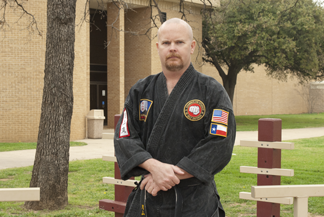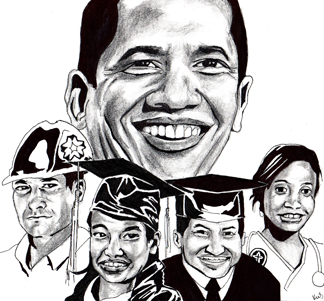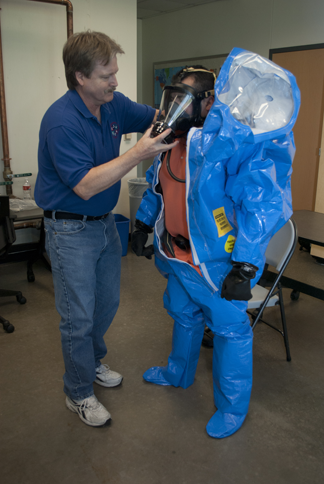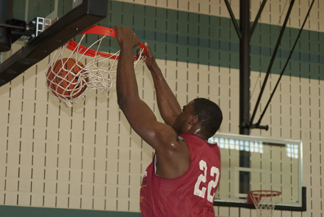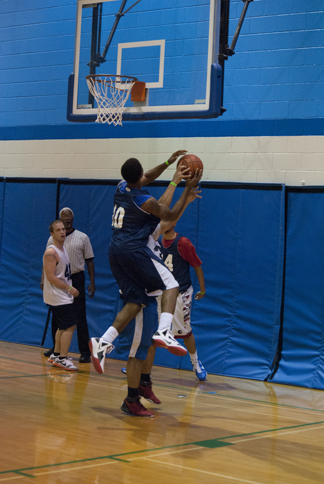By Eric Poe/sports editor
He sits back in his chair, contemplating the question. His goatee contrasts with his bald head. A picture of his dojo and its members adorns the wall. Next to that are framed trading cards he has created for the kids he teaches. He sits up and answers in the affirmative. He could, in fact, take down an assailant who came at him with a weapon drawn.
NE instructional associate Shane Whitehead is new to TCC, but not to karate. He is in fact, a sandan, or a third-degree black belt.
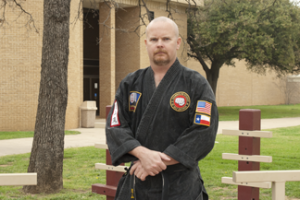
Jordan Hess/The Collegian
Whitehead has his own dojo, where he is a sensei, or master. He said he does his best to foster a family atmosphere at the dojo, including annual campouts and cookouts. His dojo includes a motley crew of students including nurses, anesthesiologists, financial analysts and surgeons. He also has dinners with samurai theater, which involves showing martial arts movies that the students enjoy but he finds unrealistic.
“I guarantee if Chuck Norris kicks you, you’re not going to get up,” he said.
Whitehead has practiced karate since he was a child but came to his dojo in 2000 partly on accident.
“I was taking my stepdaughter to dance class, and I saw the shihan, or master, just really hammering on people. And I said, ‘This is where I belong.’”
Whitehead had just moved from Arizona, where he was an aerial photographer for 12 years, which sometimes included hanging off of the deck of a helicopter to take the images.
“When you do that for 12 years, karate is pretty mild,” he said.
Karate is a way of life for Whitehead, who said he uses it everyday. He uses it in regards to interacting with people and, when necessary, to de-escalate situations. He said no black belt wants to use karate in real-life situations.
Kenpo karate is directed toward teaching self-defense, rather than tournament-style fighting. In fact, Whitehead doesn’t even teach his students a fighting stance, preferring that they remain neutral in potentially dangerous situations.
“It’s better to avoid a fight to begin with than to fight,” he said. “If you’re engaged, it’s better to win, but you avoid it if you can through verbal techniques.”
Asked if he has ever used the things he has learned to combat any assailants, Whitehead said with a wry grin, “Yes. But I’ll leave it at that.”
Karate is much more than fighting or learning how to fight. Whitehead said it also helps in growing mentally and physically as a person. Part of that is the personal relationships that come with being part of a karate family.
A major aspect of what Whitehead teaches is respect for others, highlighting pre-match bows between fighters.
“It’s a mutual respect,” he said. “The uke, or person you’re fighting, is donating their body to help you get better, to pound on them.”
Whitehead’s sensei, Nick Chamberlain, praised his teaching style and dedication.
“He takes care of his kids and the students he teaches,” he said. “He’s a hard-working instructor. Karate is not difficult. You can get a black belt, but when life changes, what it takes to get good is dedication and perseverance. You have to keep going and training, and he has managed to find that balance.”
Whitehead has continued that dedication, practicing daily in his quest to advance to fourth-degree black belt that he will attempt in October 2013. The process includes a retreat called Warrior Weekend, where he will test in an attempt at advancing rank. A research paper and presentation in front of a board of fellow black belts are also involved, which Whitehead said can be daunting.
“It’s intimidating,” he said. “It’s like a deer in headlights. But they are my peers. They’re family.”
Whitehead said ranks are important in karate as people must know their opponents. For instance, a black belt would not take on a white belt because the white belt has not yet mastered the basics. The degree of belts is also important from a pride standpoint.
“When you’re wearing that rank, you’re representing your shihan,” he said. “You’re not going to put a rank on a braggart that goes around roughing people up. We have a certain social responsibility.”
Whitehead tries to promote that responsibility in the weekly self-defense class he teaches for staff and faculty on NE.
Dagny Jackson, NE administrative assistant and a student in his class, said she is new to karate, but the lesson structure fosters a learning atmosphere.
“It is set up like a real class,” she said. “We take roll, and we do drills. It’s not simple for me, but he is making it easier. He spends a lot of time with us individually to make us better.”
Along with his teaching at the dojo and his duties at the college, Whitehead is also an avid painter and sculptor. His pieces range from abstract paintings to primitive masks. He is currently getting artwork together for an art auction on NE in March.
Whitehead’s other goals are to start Japanese and martial arts clubs on campus. He also personally wants to be a TCC mainstay.
“I’m trying to be a lifelong fixture here,” he said.
Even with his black belt, Whitehead will continue with the fundamentals of karate, which he stresses are the most important key to progressing as a sensei.
“I’m still practicing my white belt material,” he said. “I will do everything I’ve been doing since the day I started.”






















